Related Research Articles

Syria's estimated pre–Syrian Civil War 2011 population was 22 ±.5 million permanent inhabitants, which included 21,124,000 Syrians, as well as 1.3 million Iraqi refugees and over 500,000 Palestinian refugees. The war makes an accurate count of the Syrian population difficult, as the numbers of Syrian refugees, internally displaced Syrians and casualty numbers are in flux. The CIA World Factbook showed an estimated 20.4m people as of July 2021. Of the pre-war population, six million are refugees outside the country, seven million are internally displaced, three million live in rebel-held territory, and two million live in the Kurdish-ruled Autonomous Administration of North and East Syria.
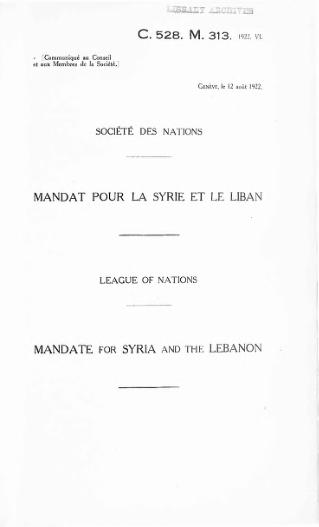
The Mandate for Syria and the Lebanon was a League of Nations mandate founded in the aftermath of the First World War and the partitioning of the Ottoman Empire, concerning Syria and Lebanon. The mandate system was supposed to differ from colonialism, with the governing country intended to act as a trustee until the inhabitants were considered eligible for self-government. At that point, the mandate would terminate and a sovereign state would be born.
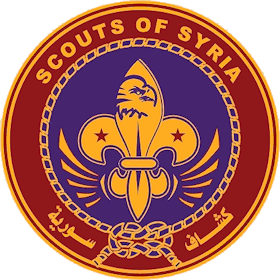
Scouts of Syria is the national Scout and Guide organization of Syria. Scouting in Syria was founded in 1912; Guiding started in the 1950s. The coeducational association serves 9,358 members and is a member of both the World Organization of the Scout Movement and the World Association of Girl Guides and Girl Scouts.

Pascal Esho Warda is an Assyrian politician and human rights lawyer from Iraq. She was previously the Minister of Immigration and Refugees in the Iraqi Interim Government under then Prime Minister Ayad Allawi.

Syrians are the majority inhabitants of Syria, indigenous to the Levant, who have Arabic, especially its Levantine dialect, as a mother tongue. The cultural and linguistic heritage of the Syrian people is a blend of both indigenous elements and the foreign cultures that have come to rule the land and its people over the course of thousands of years. By the seventh century, most of the inhabitants of the Levant spoke Aramaic. In the centuries after the Muslim conquest of the Levant in 634, Arabic became the dominant language, but a minority of Syrians retained Aramaic (Syriac), which is still spoken in its Eastern and Western dialects.

Syrian literature is modern fiction written or orally performed in Arabic by writers from Syria since the independence of the Syrian Arab Republic in 1946. It is part of the historically and geographically wider Arabic literature. Literary works by Syrian authors in the historical region of Syria since the Umayyad era are considered general Arabic literature. In its historical development since the beginnings of compilations of the Quran in the 7th century and later written records, the Arabic language has been considered a geographically comprehensive, standardized written language due to the religious or literary works written in classical Arabic. This sometimes differs considerably from the individual regionally spoken variants, such as Syrian, Egyptian or Moroccan spoken forms of Arabic.
This is a survey of the postage stamps and postal history of Syria.

Razan Zaitouneh is a Syrian human rights lawyer and civil society activist. Actively involved in the Syrian uprising, she went into hiding after being accused by the government of being a foreign agent and her husband was arrested. Zaitouneh has documented human rights in Syria for the Local Coordination Committees of Syria. Zaitouneh was kidnapped on 9 December 2013, most likely by Jaysh al-Islam. Her fate remains unknown. It is suspected that she has been killed.

The Syrian Federation, officially the Federation of the Autonomous States of Syria, was constituted on 28 June 1922 by High Commissary Gouraud. It comprised the States of Aleppo, Damascus, and of the Alawites, spanning an area of 119,000 to 120,000 km2. It was officially dissolved by decree of 5 December 1924 "which received its application starting on 1 January 1925".

Randa Kassis is a Franco-Syrian politician and a leading secular figure of the Syrian opposition. She was the President of the Astana Platform of the Syrian opposition and the founder of the Movement of the Pluralistic Society. She is a close friend of Sergey Lavrov.
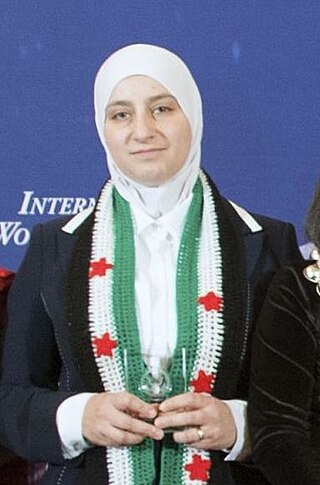
Majd Izzat al-Chourbaji is a Syrian peace activist. In 2015, she was awarded the U.S. State Department's International Women of Courage Award, for her work with women and human rights advocacy in Syria.
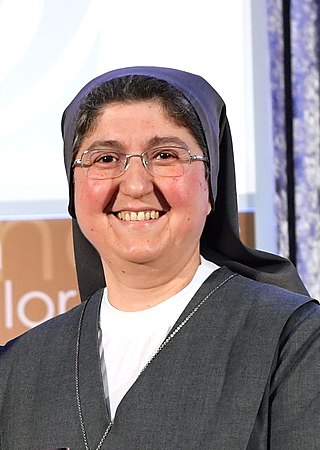
Carolin Tahhan Fachakh or Sister Carol, is a Syrian nun who cared for women and children in Damascus during the Syrian Civil War. She was awarded an International Women of Courage Award in 2017. This was despite her support of the Syrian president Bashar al-Assad.
Asma Khalifa is a Libyan women's rights and peace activist. Her work has spanned across numerous countries including Libya, Yemen and Syria. She won the Luxembourg Peace Prize in 2016 and was named as one of the 100 most influential young Africans of 2017 by the Africa Youth Awards.
Suad Lakišić Bushnaq is a Jordanian-Canadian film and concert composer. She is best known for her work on the films Al Munataf,Twice Upon a Time and Tight Spot.
Khalil Maatouk is a Syrian lawyer and human rights defender. Arrested at a roadblock in October 2012, he has been missing since then.
Souad Nawfal is a Syrian Muslim schoolteacher and activist who became known for her protests against Bashar al-Assad and the Islamic State (ISIS) in Syria. She received the Homo Homini Award, a human rights award, in 2014.

Khadija Baker is a Syrian Kurdish and Canadian artist and performer who lives in Montreal.
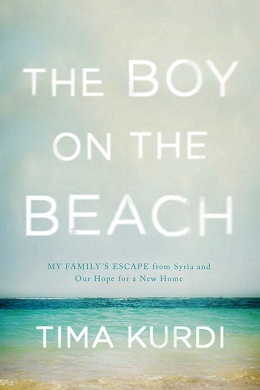
The Boy on the Beach is a 2018 memoir by Tima Kurdi about her family's attempts to escape the Syrian civil war and the circumstances that lead to the death of Alan Kurdi.

Anni Lanz is a Swiss human rights activist with a focus on Switzerland's refugee policy. Today she is active in the refugee aid organization Solidarité sans frontières.

Kefah Ali Deeb is a Syrian human rights activist, artist and writer. She left Syria after persecution during the Syrian war and has been living in exile in Berlin, Germany, since 2014. In Germany, she has been interviewed and published her own opinion columns about the life of migrants in German newsmedia and online projects. Since 2015, she has also been active as a museum guide for the Multaka project, an initiative of Berlin museums to convey art historical contexts to Arabic-speaking visitors. As writer and translator she also has published several books for children in Arabic.
References
- 1 2 3 4 5 6 7 8 Gervais, Lisa-Marie (2021-03-15). "De la Syrie au Canada, l'exil infini de la famille Dureid". Le Devoir (in French). Retrieved 2022-04-07.
- 1 2 Perkins, Julianna (6 Feb 2021). "Newcomers to Quebec need more opportunities to learn about Indigenous history, activists say". CBC.
- 1 2 "Muzna Dureid's Journey to Advancing Women's Rights". carleton.ca. 6 March 2020. Retrieved 2022-04-07.
- ↑ Gosselin, Janie (2021-10-20). "Syrie | La normalisation des relations avec Damas suscite l'inquiétude". La Presse (in French). Retrieved 2022-04-08.
- ↑ Life Writing Outside the Lines: Gender and Genre in the Americas. (2020). United Kingdom: Taylor & Francis.
- ↑ "Muzna Dureid". Women Deliver. Retrieved 2022-04-08.
- ↑ Brewster, Murray (28 Oct 2018). "Former Syrian White Helmet rescuers, reluctantly resettled, embrace their new lives in Canada". CBC.
- 1 2 3 "2019 CanWaCH Awards". CanWaCH. Retrieved 2022-04-07.
- ↑ "Meet Muzna Dureid, Syria/Canada". Nobel Women's Initiative. 2019-11-28. Retrieved 2022-04-08.
- ↑ Morgan Lowrie (2018-04-15). "Réactions mitigées au pays aux frappes en Syrie". Journal Métro (in French). Retrieved 2022-04-08.
- ↑ "Canada's women, peace, and security awards | IDRC - International Development Research Centre". idrc.ca. 10 February 2022. Retrieved 2022-04-08.
- ↑ "Muzna Dureid". Centre for International Governance Innovation. Retrieved 2022-04-08.
- ↑ "The Salle de diffusion de Parc-Extension presents 'Birds Crossing Borders' | Fringe Arts". thelinknewspaper.ca. Retrieved 2022-04-07.
- ↑ By Ozlem Ezer (2018) Drawing a Narrative Landscape with Women Refugees, a/b: Auto/Biography Studies, 33:3, 612-619, DOI: 10.1080/08989575.2018.1499493